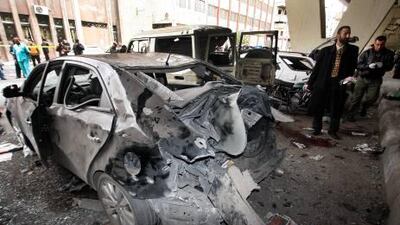DAMASCUS // A suicide bomb exploded in Damascus yesterday killing at least 26 people and wounding dozens more, officials said.
The attack came as nationwide protests continued and activists accused security forces of fatally shooting 17 civilians. It was the second suicide bombing in the past two weeks to hit the capital.
Yesterday's attack occurred in Midan, a densely populated, middle-class neighbourhood in the south of the city that has played a key role in the uprising since it began in March, holding regular anti-regime protests.
The interior minister, Mohammed Shaar, said a suicide bomber had, "detonated himself with the aim of killing the largest number of people". State media estimated the death toll at 26 - with 15 of corpses so badly destroyed they were impossible to piece together - with 63 wounded, "most of them civilians".
No one was formally blamed for the attack. The Syrian foreign ministry spokesman Jihad Makdissi said the investigation was on-going.
State media estimated the death toll at 25 - some corpses were so badly destroyed they were impossible to piece together - with 46 wounded, "most of them civilians".
Syrian television broadcast graphic images of the scene, with men in plastic gloves putting body parts into bags and holding up human remains to the camera.
A police station was damaged and a number of police vehicles were torn apart by shrapnel and soaked in blood, including busses used to transport security officers.
The area where the explosion happened, beneath a raised motorway, has been regularly used on Fridays as a staging point for security forces, deployed to face protesters as they rally after prayers.
Activists said they had planned to demonstrate in Midan yesterday.
The bomb exploded near a school, which was closed for the weekend, and would surely have caused a higher civilian death toll if detonated during the week when the roads are jammed with traffic and pedestrians. Around the time of midday Friday prayers - when the bomb went off - security is heightened and traffic tends to be light, with many people preferring not to venture outside.
On December 23, two suicide car bombs hit separate security offices, killing more than 44 people according to the government. The interior ministry blamed Al Qaeda for the attack, but no group has claimed responsibility.
While relatively small scale bombings - booby trapped gas canisters and home made anti-personnel mines - have been frequently reported in the provinces, including restive areas such as Homs, Hama and Idleb, the Syrian capital had up until then been spared.
But since the arrival of the Arab League observers on December 22 to monitor use of violence by regime forces against protesters, three powerful explosions have rocked Damascus. Syrian officials say the blasts are clear evidence the country is facing militant Islamist groups, not a peaceful call for greater political freedoms.
"It is another bad day, after the first bombings we all feared and expected more, and I'm sorry to say that we were right," said a Syrian analyst. "The situation just keeps getting worse."
As with the previous attacks, supporters of President Bashar Al Assad blamed anti-regime activists, while opposition groups said they believed the authorities had planted the explosives.
An angry crowd gathered at the scene of yesterday's bombing, and in a main square of central Damascus, to denounce opposition groups and to accuse them, and Syria's international critics, of terrorism.
The Muslim Brotherhood, a member of the Syrian National Council opposition bloc, called for an independent international inquiry into the bombing, saying the authorities were not to be trusted.
It also said only Syria's security services had the capabilities to carry out such an attack, and that the regime had benefited most from the bombing, which grabbed international headlines and distracted the attention of Arab League monitors from on-going suppression of widespread protests.
Demonstrations involving tens of thousands of people took place across the country yesterday, including Damascus neighbourhoods as protesters sought to keep pressure on Mr Al Assad 10 months into the uprising.
According to the Local Coordination Committees (LCC), a nationwide network of activists, 17 civilians and three defecting soldiers were killed by security forces. The LCC say more than 400 civilians have been killed since the Arab League monitors arrived.
An Arab League committee is to meet in Cairo tomorrow to discuss a preliminary report by the observers, amid heavy criticism of the mission by activists for failing to halt the bloodshed.
Nabil Elaraby, the Arab league chief, has defended the observers' record, saying they have helped get more than 3,000 prisoners freed, tanks pulled out of urban centres and food into ravaged areas of Homs. He has appealed for them to be given more time and greater resources.
Speaking in the Egyptian capital yesterday after meeting Khalid Meshaal, the head of Hamas, Mr Elaraby said he gave the movement's leader a message to convey to the Syrian authorities reminding them of the need for "integrity, transparency and credibility" to bring a stop to the violence.
Mr Meshaal has long been based in Syria but a close relationship with Mr Al Assad's regime has been strained by Hamas' refusal to endorse its handling of the uprising.
More than 5,000 civilians and defecting soldiers have been killed by Syrian security forces since March, according to the most recent United Nation's count - a tally now weeks out of date.
Syrian officials dispute the figure, saying more than 2,000 security personnel have been killed by "armed terrorist gangs", who they blame for any civilian deaths.
psands@thenational.ae

